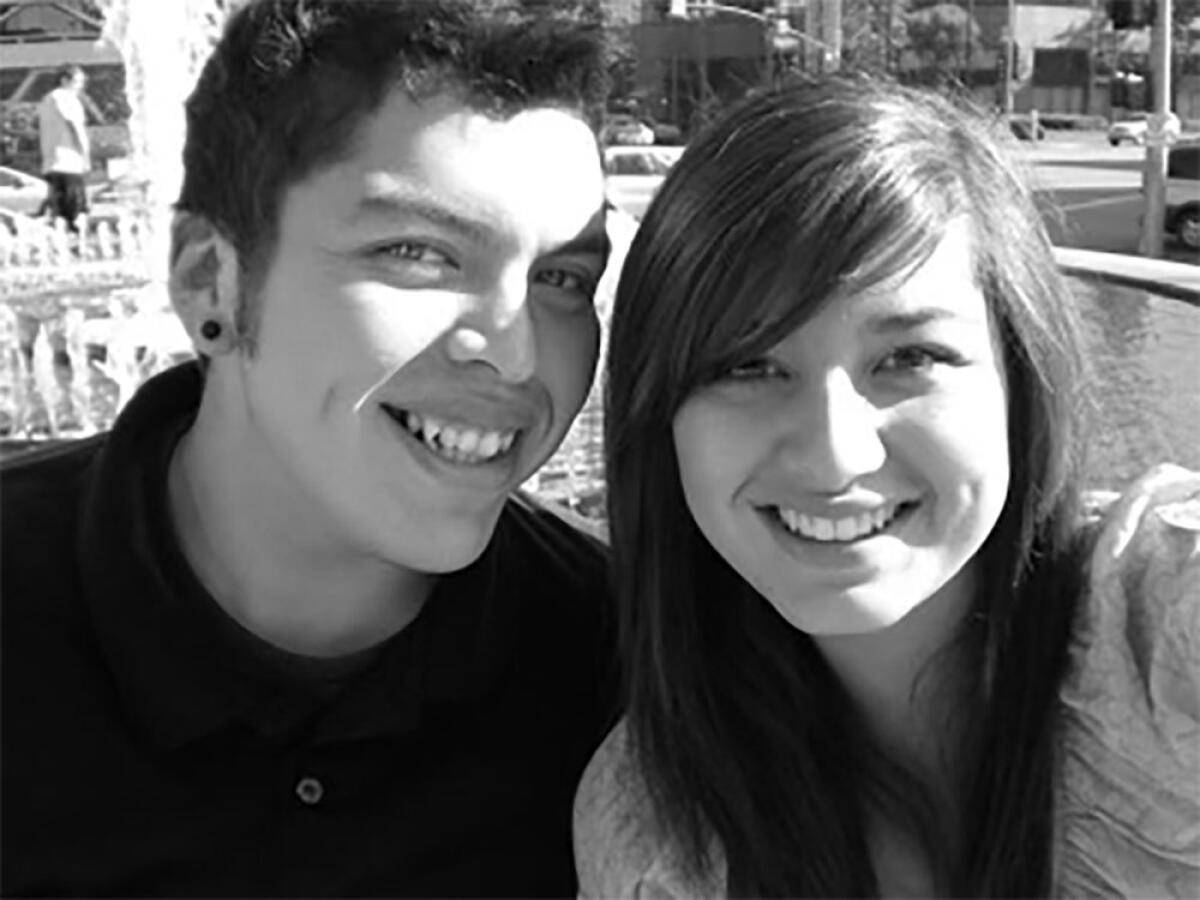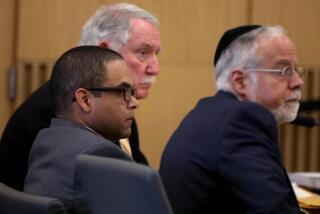Aspiring actor, homeless in L.A., was fatally shot by CHP officer on 105 Freeway

Jesse Dominguez had the same aspirations many in Los Angeles do: to be an actor.
And he shared the same struggles too: substance use issues, a serious mental health disorder and homelessness.
On Sunday afternoon, while in what his family said must have been a mental health episode or drug-fueled crisis, Dominguez was shot and killed by a California Highway Patrol officer following a struggle on the 105 Freeway in Watts near the sober living facility where he lived.
CHP officials said that during the altercation, Dominguez “was able to access a Taser” and used it against the officer.
“In fear for his safety, the officer fired his service weapon, striking the pedestrian,” the CHP said in a statement.
His family, however, sees the incident differently.
“I’ve pretty much ‘backed the blue’ in a lot of circumstances,” Akasha Dominguez, the man’s stepmother, said referring to a slogan about supporting police. “There have been issues where [police] used excessive force. But I’ve never been on the other end. Now I have a completely different stance. This is absolutely police brutality.”
CHP officials said they responded to the freeway about 3:15 p.m. Sunday after receiving calls about a man walking through traffic near the Wilmington Avenue exit.
His family said that Dominguez did carry a Taser for protection after being threatened by others living at the facility where he was staying.
Akasha Dominguez and other family members were in shock Tuesday after learning that Dominguez had been killed. Graphic video appeared to show the encounter leading up to the shooting, during which Dominguez and a CHP officer wrestle on the pavement of the closed freeway before the officer stands and repeatedly shoots Dominguez.
The end of his life was unfathomable to Dominguez’s family members, who knew the 33-year-old as a troubled man who was a “softie” and wanted more than anything to be an actor, though he never got any roles.
Dominguez struggled with bipolar disorder as well as substance use disorder, according to his father, Jesse Dominguez. He wanted to be an actor or a singer, but bounced around from job to job, mostly waiting tables. While family had tried to help the younger Dominguez, who was homeless, and offered him places to live, he wanted to make it on his own, his father said.
His failure to make it as an actor depressed him, family said.
“We just feel terrible that L.A. just robbed him. The Hollywood scene sucked him in to wanting to be that persona. No matter how hard we tried to get him to do other jobs or seek formal education, that’s what he wanted to do. We weren’t going to crush his dreams,” Dominguez’s father said.
The 55-year-old former Marine told The Times that he could not bring himself to watch the bystander video that appears to show the last moments of his son’s life. But his wife and daughter have.
Mental health news and resources to help you cope with the stress of daily life, anxiety and more.
The family is grappling with the same questions that use-of-force experts say will become the focus of the investigation into the shooting by the officer, who has not been identified.
“I don’t know why the officer thought to engage. If someone is walking on the freeway, something is not right. They’re either in mental health crisis or something else is happening,” Akasha Dominguez said. “He was not trying to hurt anybody. Why did he have to use that type of force? After [the officer] had already discharged his firearm once, why did he stand up and then do it again and again and again?”
The questions Dominguez’s stepmother asked will likely be addressed in the California Department of Justice’s investigation into the deadly shooting.
The DOJ investigates police shootings in which an unarmed civilian is killed.
Law enforcement experts interviewed Monday by The Times were divided.
Travis Norton, a law enforcement officer who runs the California Assn. of Tactical Officers After Action Review, said video is a limited way to understand a police shooting.
“It is hard to diagnose without knowing what the officer saw, experienced and interpreted was happening,” Norton said. “All I see is a very short scuffle. I see the suspect point something that appears to look like some sort of weapon. ... From the video, without knowing anything else about it, the use of deadly force appears appropriate.”
But other experts said the use of force raises many questions.
Ed Obayashi, a police shootings expert who investigates the incidents for numerous law enforcement agencies in California, said investigators will immediately ask the officer why he was engaging with the person without a partner or backup in the immediate vicinity.
“Why did you shoot him while he was on the ground?” Obayashi said investigators will ask. “You separated yourself from the individual; why was he still a threat to you?”
Akasha Dominguez said she didn’t understand why the officer engaged without backup and why he resorted to deadly force so quickly — even if her stepson had a Taser.
“I don’t know when using deadly force became the first thing cops do in this situation,” said Michele Dominguez, the man’s sister.
Family members said they were reaching out to civil rights attorneys and waiting for the results of the investigation, which could take months or even years.
For now, Dominguez’s father said he would not watch the video, but acknowledged he is only delaying the inevitable.
“I’m going to have to watch the video. I know at some point I do have to see it. But I’m just so raw right now,” he said. “The last time that I saw him, he was smiling. He was happy. And the last thing that I want to see is to have my last memory of him be him going through what he did in that video.”
Times staff writer Ashley Ahn contributed to this report.
More to Read
Sign up for Essential California
The most important California stories and recommendations in your inbox every morning.
You may occasionally receive promotional content from the Los Angeles Times.













